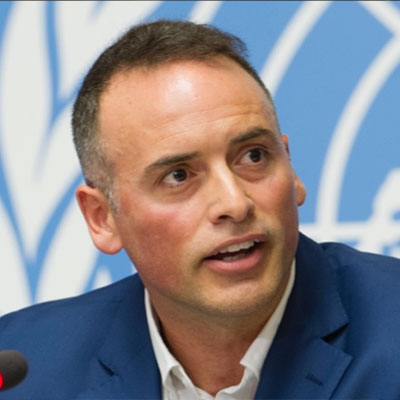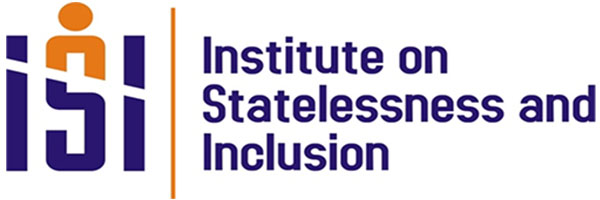THE NEW GLOBAL ALLIANCE TO END STATELESSNESS
Convene. Catalyse. Change.
The Global Alliance to End Statelessness in a new initiative that by 2030 seeks to accelerate solutions to statelessness through a collective multistakeholder approach, which centres and respects the experience of those who are stateless and formerly stateless.
To implement the recommendation to “end statelessness” found in the UN Secretary General’s ‘Our Common Agenda’ report, UNHCR is serving as the Secretariat to lead the establishment the Global Alliance To End Statelessness. The Global Alliance will seek to build on the concrete gains and momentum generated by the #IBelong Campaign to End Statelessness by 2024 and serve as a platform to increase collective advocacy efforts, catalyse political commitments to address the problem, and accelerate the implementation of concrete solutions to statelessness. The Global Alliance will be launched in 2023.
A Global Alliance Taskforce, composed of stateless and formerly stateless people, civil society organisations, academic institutions, faith-based organisations, UN and other international entities has been established to jointly develop the foundational elements of the Global Alliance: its vision and mission; its governance structure; its strategy and a workplan. You can find out more about the organisations represented on the Global Alliance Taskforce below:
Global Alliance Taskforce Members
The Canadian Centre on Statelessness is Canada’s first and only non-governmental organization working towards ending statelessness through research, advocacy and community building.
Through the Global Alliance, the Canadian Centre on Statelessness looks forward to exchanging knowledge, building new partnerships, and finding innovative ways to resolve statelessness with partners worldwide.

Represented by:
Jocelyn Kane,
Founder and Board Member
The European Network on Statelessness (ENS) is a civil society alliance of over 170 NGOs, community organizations, academic initiatives, and individual experts in 41 countries committed to addressing statelessness.
ENS hopes to see the Global Alliance Taskforce effectively design, develop, and implement this important initiative as part of ongoing efforts to eradicate statelessness. Drawing on our own community engagement principles and strategy, we also want to utilize our membership of the Taskforce to help promote the inclusion and centering of stateless changemakers (stateless people and community-led organizations) as part of the development of the Global Alliance.

Represented by:
Chris Nash
Director and Co-Founder
Family Frontiers functions as a self-led group where a majority of its leadership, board and membership consist of those impacted by Malaysia’s gender discriminatory citizenship laws. Family Frontiers campaigns for gender-equal citizenship laws and policies, providing support for women in binational marriages, and amplifying the voices of affected persons while building capacity and centering the lived realities of affected persons.
Family Frontiers hopes that the Global Alliance will establish a roadmap for improved engagement and meaningful partnership with stateless communities and facilitate their access in decision making, eliminate gender discriminatory nationality laws to significantly contribute to the reduction of statelessness and mobilize resources too stateless-led organizations and grassroots organizations.

Represented by:
Bina Ramanand
Lead Coordinator
The Global Campaign for Equal Nationality Rights (GCENR) is a coalition of national and international organizations, independent activists, academics, and UN partner agencies working to end gender discrimination in nationality laws. Housed at Women’s Refugee Commission, GCENR executes its mission through a combination of advocacy activities at the national, regional, and international levels, civil society capacity building, and the development of advocacy resources and tools.
GCENR hopes that through its alliance of diverse and influential stakeholders, the Global Alliance will mobilize governments to take action without delay to eliminate discriminatory provisions from nationality laws.

Represented by:
Catherine Harrington
Campaign Manager
Haki Centre Organization (HCO) is a non-governmental organization working in the coastal region of Kenya to promote social justice through human rights education and advocacy, peacebuilding, and legal empowerment focused on nationality rights.
HCO hopes that the Global Alliance will build on the momentum of the IBelong Campaign to foster national, regional, and global solidarity as well as sustainable partnerships, shared responsibility and commitment to eradicating statelessness beyond 2024.

Represented by:
Andrew Ochola
Programs Manager
The Institute on Statelessness and Inclusion (ISI) is the first and the only human rights NGO dedicated to promoting the right to a nationality and the rights of stateless people globally. Central to this work is the strategic leadership and partnership with stateless-led organizations, individuals, and NGOs to enlarge the visibility of statelessness and advance its positioning as a human rights issue.
ISI welcomes the initiative taken by UNHCR to establish a Global Alliance as a way to promote more cohesive and concerted global action and to build on the critical work undertaken throughout the IBelong Campaign.

Represented by:
Grant Mitchell
Head of Advocacy
The Inter-Parliamentary Union (IPU) is the global organization of parliaments founded in 1889 as the first multilateral political organisation in the world. Today, the IPU comprises 178 national Member Parliaments and 13 regional parliamentary bodies. In cooperation with UNHCR, it has implemented a series of initiatives aimed at building the awareness of parliament as well as their political will to end statelessness.
The Inter-Parliamentary Union hopes that the Global Alliance will help to coordinate, streamline and amplify efforts carried out across the board to end statelessness, supporting first and foremost legislative change to end discrimination in nationality laws and facilitate access to an identity for all.

Represented by:
Kareen Jabre
Director – Division of Programmes
Nationality For All (NFA) is a regional organization working on the right to nationality and addressing statelessness in the Asia Pacific region. NFA’s core value is to strengthen the fair and meaningful participation of persons with lived experiences of statelessness in the advocacy of statelessness.
As a member of the Taskforce and possibly of the Global Alliance, Nationality For All hopes that the Global Alliance will strategically include persons with lived experience of statelessness as active members and decision-makers.

Represented by:
Subin Mulmi
Executive Director
The Office of the High Commissioner for Human Rights (OHCHR) is the leading UN entity on human rights. UN Human Rights represents the world’s commitment to the promotion and protection of the full range of human rights and freedoms set out in the Universal Declaration of Human Rights.
OHCHR hopes that the Global Alliance will move the world a step closer to eradicating discrimination, especially against stateless people, allowing them to enjoy their human rights fully.

Represented by:
Hernan Vales
Human Rights and Democracy Advisor
Melbourne Law School’s Peter McMullin Centre on Statelessness (PMCS) was established in 2018 with the objective of undertaking research, teaching and engagement activities aimed at reducing statelessness and protecting the rights of stateless people in Australia, the Asia Pacific region, and as appropriate more broadly.
PCMS believes that there is great potential though the Global Alliance for a collaborative approach to pushing the statelessness agenda at the international level including through bringing high quality academic research from a range of disciplines to bear on legal, normative and policy reforms.

Represented by:
Michelle Foster
Director
Salam for Democracy and Human Rights is an NGO that endeavors to preserve universal principles of dignity and respect by shielding democracy and human rights. To accomplish these goals, Salam DHR conducts monitoring and analysis, produces reports, develops recommendations on policy and legislation, organizes advocacy campaigns, conducts training, and builds effective coalitions.
Salam DHR hopes that the Global Alliance will support the achievement of common goals and objectives to confront the crisis of stateless persons all around the world.

Represented by:
Jawaad Fairooz, Chairman
UNICEF works in more than 150 countries to protect children from violence, exploitation, and abuse. We partner with governments, businesses, civil-society organizations, and communities to prevent all forms of violence against children, and to support survivors, including with mental health and psychosocial services.
UNICEF hopes that the Global Alliance will help to ensure every child is registered at birth and provided with a birth certificate, advocate for the removal of gender or sex discrimination from civil registration and nationality laws, strengthen UNICEF, government and civil society capacities at the country level to prevent and end childhood statelessness, and support governments to develop and implement country strategies to prevent childhood statelessness.

Represented by:
Kristen Di Martino
Senior Advisor Child Protection
United Stateless (USL) is a national organization led by stateless people whose mission is to build and inspire community among those affected by statelessness, and to advocate for their human rights.
Through the Global Alliance, USL envisions a world where everyone’s human right to nationality is respected and upheld, and no one is deprived of nationality based on their race, ethnicity, sex, gender, or religion – as stated in Article 15 of the Universal Declaration of Human Rights.

Represented by:
Karina Ambartsoumian-Clough
Executive Director
Vital Strategies is a leading global public health organisation. One of Vital Strategies’ current programs is to improve civil registration and vital statistics. Our technical assistance includes strengthening CRVS governance and system design; improving notification and registration of vital events; increasing the quantity and quality of cause of death data; and supporting the production of high-quality vital statistics.
Everyone should count, yet millions around the globe live without the basic rights, benefits and protections afforded by a legal identity and many will die without even a proof of existence. The work of the Global Alliance to End Statelessness can greatly improve this by making the invisible, visible.

Represented by:
Joan Sara Thomas
Technical Advisor, CRVS Improvement
The World Council of Churches (WCC) is a fellowship of 352 churches, in more than 120 countries and territories throughout the world, representing over 580 million Christians. Since 2011, through its Commission of the Churches on international Affairs (CCIA), the WCC has taken up the issue of stateless people.
The WCC hopes that the Global Alliance will be a space where narratives, visions and dreams of stateless people will be heard and shared, where we will see the human face and impact of statelessness. We also hope that the Global Alliance will be an opportunity to work closely with faith communities which are present in the most remote areas of this planet.

Represented by:
Peter Prove
Director, Commission of the Churches on International Affairs
For any queries about the establishment of the Global Alliance, please contact Marin Roman, ([email protected]) or Monika Sandvik ([email protected])















